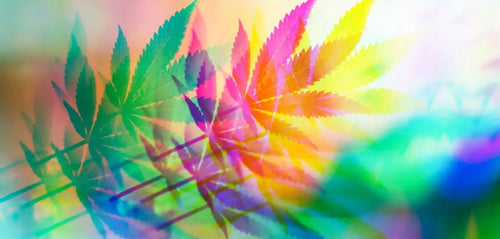#16: The Rise of Hash: From Ancient Rituals to Modern Day Legalization
#16: The Rise of Hash: From Ancient Rituals to Modern Day Legalization
Long before shatter and dabs rose to prominence, an age-old concentrate method was used to create extracts for consumption. Hash, which is made from the trichomes of a cannabis plant, has a long history in Morocco, Nepal, Afghanistan, India, and other regions historically known for growing cannabis.
Also known as “charas”, "bhang" or “hashish”, it has been used for centuries to produce a potent form of cannabis. Historians believe that hash consumption began in Central Asia and Persia, where it was used as incense, medicine, and for religious purposes.
In recent years, hash has become increasingly popular in modern cannabis culture. Although the methods of making it vary from country to country, the premise remains the same: separating the trichomes (which contain all of the active ingredients) from other plant materials and compressing them into a solid form. This results in a concentrated form of cannabinoids and terpenes that can be more potent than traditional cannabis flower.
In this article, we’ll explore the history of hash, the various types of hash available today and the different ways to consume it. Join us as we uncover the world of hash and uncover why it’s become a staple in cannabis culture.
Tracing the roots of hash: A look into its ancient history

Though the origin of hash is unclear, it’s believed that the Silk Road traders of eastern Asia spread its use throughout Central Asia and Persia over 1,000 years ago. In many of these cultures, hash was used for religious and spiritual purposes as well as for medical treatments.
In India, it was known as “bhang” and used in sacred ceremonies and rituals. In the Middle East, hashish (which means "grass" in Arabic) was popular among Sufis — an Islamic mystical sect — who used it to reach spiritual enlightenment. And in Nepal, "charas" was consumed as a medicine, an intoxicant and for pleasure.
In 1090, the Order of the Assassins, known as the Hashshashin, formed in what is now Iran. Their name was derived from the word “hashish”, which they used to refer to cannabis plants. It was said that their leader, Hassan-i Sabbah, gave his followers hashish to make them fearless and obedient, and they soon gained a reputation as formidable warriors.
Throughout the centuries, hash spread from its origins in Central Asia and Persia, eventually reaching Europe and North America. In the late 19th century, it gained popularity among intellectuals and artists.

During this period, hashish clubs such as the Club des Hashischins in Paris, began to form and spread throughout Europe. Prominent figures like Victor Hugo and Honoré de Balzac were all known members of these clubs.
The Americas also experienced a wave of hashish use in the late 19th century and early 20th century. Jazz musicians, writers and beatniks often used hashish to fuel their creativity. Musician Louis Armstrong was one of the most notable users, having used it throughout his career.
Today, hash is still popular in many parts of the world and has become increasingly prevalent with the rise of cannabis legalization. With its enthralling history and strong presence in modern culture, hash is sure to remain an integral part of the cannabis community for years to come.
From handmade to high-tech: How hash is made

Traditional methods of making hash involve separating the trichomes (which contain all of the active ingredients) from other plant materials and compressing them into a solid form. In India and Nepal, charas is made by rubbing the live cannabis plant between the hands until the trichomes have collected and formed into a sticky black resin. This is then rolled up, pressed and heated to create a solid form of hash.
Sieving is another popular method of making hash. This involves sieving the dried and cured cannabis plant material through a mesh screen or sieve. The trichomes, which have collected on the surface, can then be scraped off and pressed into a solid form of hash. Countries like Morocco and Lebanon have long traditions of making hash in this way.
While some artisans still make it by hand, modern methods often involve mechanical sifting and extraction machines that can quickly and efficiently produce a variety of different types of hashish. Modern-day hash comes in a variety of textures, colours and strengths. Some are light and fluffy like powder, while others are dense and hard like rocks. Depending on the method, solvents can also be used to extract the trichomes and create a more concentrated form of hash.
Navigating the world of hash: Understanding the different types
There are many different types of hash available today, each with its own unique characteristics. With a variety of textures, colours and levels of potency, there is a hashish to suit every preference. Here are some of the most common types:
Bubble hash is made by soaking cannabis in ice water and then agitated until the trichomes break off. The mixture is then filtered through a series of mesh screens, which separate out the trichomes and form a concentrated product that looks like wet sand. This can be pressed into various shapes depending on its consistency.
Dry sift hash is another popular option, which involves using a series of mesh screens to sift the trichomes away from the plant material. This creates a light, powdery concentrate that is considered to be among the purest forms of hash. A full-melt dry sift is the most refined type of dry sift, which will completely melt away when heated.
Aged hash, like a fine wine, can be a thing of beauty. This type of hash is stored in optimal conditions for a period of time, allowing the terpenes to mature and the flavour to mellow. Similar to how red wine changes with age, aged hash gets more and more complex over time and can have a rich and unique flavour profile. It's a true connoisseur's delight!
Rosin hash is a newer type of hash that is created using heat and pressure to extract the trichomes from the cannabis plant. It’s becoming increasingly popular due to its quick production time and solvent-free extraction process. Made by pressing buds or hash between parchment paper and a heated element, rosin hash is a great option for anyone looking for a clean concentrate with a high terpene content.
Shatter, wax, budder and live-resin are solvent-based extractions that have become increasingly popular in recent years. Though not traditionally considered “hash”, these concentrates are created by using a solvent to extract the trichomes from the plant material. The process produces a highly concentrated product that is then purged of any solvents and molded into a solid form.
Hash oils are also gaining popularity, and are typically made by using a solvent like CO2, Butane or Propane to extract the trichomes from the plant material. This creates a thick, viscous oil with a high concentration of active compounds. Vape cartridges are often filled with these oils, though they can also be used as an ingredient in edibles and other cannabis-infused products.
A northern touch: Canadian hash culture
Since legalization in 2018, hash has become increasingly popular in Canada, with a variety of local producers creating high-quality concentrates for both medical and recreational consumption. From solvent-based extractions to dry sift and rosin, Canadian producers are taking the art of hash making to the next level. Here are just a few of the amazing artisans creating hash in Canada:
• North 40 Cannabis - Gord at North 40 takes his love of hash-making to a whole new level, creating traditional hash and rosin with an artisanal flair. Gord's traditional hash is made using dry sift and rosin techniques, creating a truly unique experience for cannabis connoisseurs.
• Earthwolf Farms - This farm located in Lillooet, BC creates a variety of premium aged hash and rosin with a focus on organic agriculture using sustainable practices. Their bubble hash is made using plants frozen after harvest, giving it an intense flavour and aroma.
• HashCo - Through their knowledge of old-world practices, HashCo produces nostalgic hash and kief that bring back the days of classic cannabis consumption. Their products are inspired by traditional hash-making techniques, with a modern twist to create truly unique concentrates.
• Good Buds - This craft cannabis company based in Salt Spring Island, BC produces premium-grade bubble hash and rosin with a focus on handcrafted quality. Extracted exclusively from organic flower from their family farm, Good Buds’ hash is a must-try for any hash enthusiast.
• Atlantic Cultivation - This company based in St John's, Newfoundland creates a variety of premium-grade concentrates, including shatter, wax and bubble hash. Their products are made using both solvent-based extraction methods and ice water extraction, providing a variety of high quality options for cannabis enthusiasts.
• Retro Cannabis - another maritime company based in Charlottetown, PEI, Retro Cannabis produces hash oil using CO2 extraction methods and strain-specific bubble hash. With a vintage vibe and modern extraction techniques, Retro Cannabis provides a truly unique experience with a classic cannabis feel.
With so many amazing companies producing top-notch hash in Canada, it's never been easier to enjoy the unique effects of this potent concentrate. Whether you're looking for a mild and subtle experience or an intense and flavorful one, hash is the perfect way to get your cannabis fix.
The different ways to consume hash
When it comes to consuming hash, the possibilities are virtually endless. Depending on the type of hash, it can be added to a joint or blunt, smoked from a bong or pipe, vaped in a pen, or dabbed on a rig.

The most common way to consume hash is by sprinkling it over flower in a joint or blunt, but really the only limit is your imagination!
For those who want a more subtle experience, hash can also be added to food as an ingredient in edibles. The flavour of hash is generally quite mild, making it an ideal addition to any recipe. Consider adding it to brownies, cookies or other treats for a unique cannabis-infused experience.
Lastly, topical products like oils, balms, and salves can also be infused with hash, as its high concentration of cannabinoids makes it ideal for providing localized relief from pain and inflammation. A little bit of hash can go a long way in providing relief from everyday aches and pains.
Hash: A timeless tradition in cannabis culture
From its humble beginnings in the Middle East to its global popularity today, hash has come a long way to becoming an immensely popular choice for cannabis connoisseurs all over the world. With such a wide variety of consumption methods and products, it's easy to see why hash is so sought-after. From hand-pressed hash to solvent-based extractions, there's a type of hash for everyone and every occasion. So if you're looking for a unique and potent cannabis experience, hash is sure to please. Enjoy!














